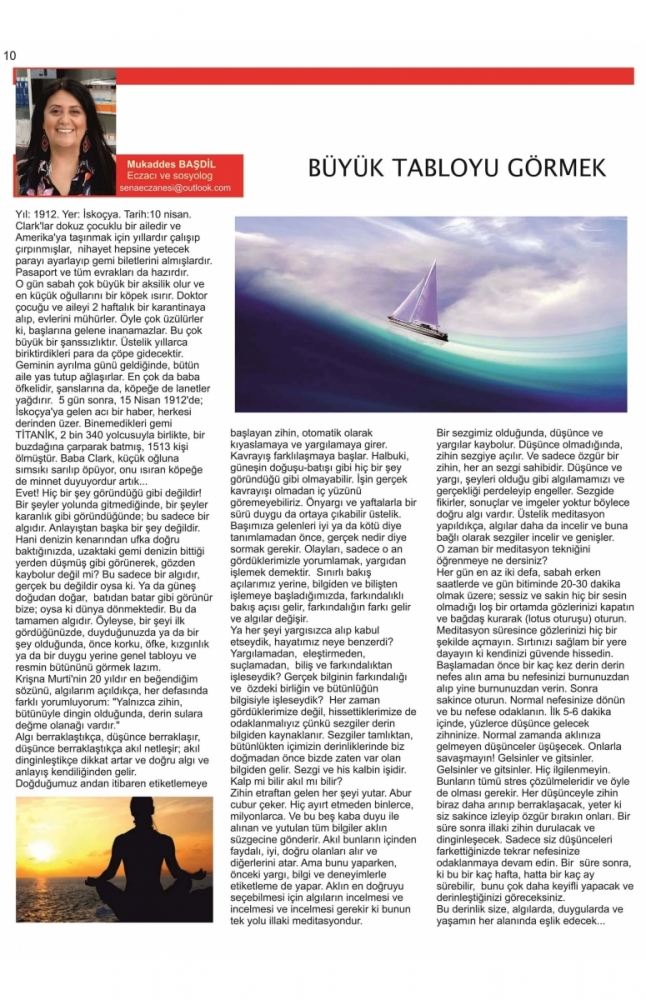No products

SEEING THE BIG PICTURE
Year: 1912. Place: Scotland. Date: April 10th.
The Clark's are a family of nine children and they have been working hard for years to move to America, finally they have enough money for all of them and they have bought their boat tickets. Their passports and all their papers are ready. On the morning of that day, a huge mishap happens and their youngest son is bitten by a dog. The doctor quarantines the child and the family for 2 weeks and seals their house. They are so upset that they cannot believe what has happened to them. This is a great misfortune. Moreover, the money they have saved for years will go to waste. When the day comes for the ship to leave, the whole family mourns and cries. The father is the most angry, cursing both their luck and the dog. 5 days later, on April 15, 1912, a bitter news arrives in Scotland, deeply upsetting everyone. The ship they could not board, the TITANIC, sank after hitting an iceberg with 2,340 passengers, killing 1513 people. Clark, the father, hugs and kisses his little son and is grateful to the dog that bit him... Yes! Nothing is ever what it seems! When something goes wrong, when something seems dark, it's just a perception. It is nothing but understanding. You know when you look towards the horizon from the edge of the sea and the ship in the distance seems to have fallen from the end of the sea and disappears from sight, right? This is just a perception, this is not the reality. Or the sun seems to rise in the east and set in the west, whereas the earth is rotating. This is also purely perception. So, the first time you see something, hear something, or something happens, instead of fear, anger, resentment or any emotion, you should first see the overall picture, the whole picture. My favorite quote of Krishna Murti's for the past 20 years, I interpret it differently each time as my perception opens up: "Only when the mind is completely still is it possible to touch deep waters." As perception becomes clearer, thought becomes clearer; as thought becomes clearer, the mind becomes clearer; as the mind becomes calmer, attention increases and correct perception and understanding come spontaneously. The mind, which starts labeling from the moment we are born, automatically starts comparing and judging. Understanding starts to differentiate. However, like the rising and setting of the sun, nothing may be as it seems. Without real insight, we may not be able to see through it. Prejudices and labels can also bring out a lot of emotions. Before defining what happens to us as good or bad, we need to ask what the truth is. Interpreting events only with what we see at that moment means operating from judgment. When we start processing from knowledge and cognition instead of our limited perspectives, the mindful perspective comes, the difference of mindfulness comes and perceptions change. What would our life be like if we took everything without judgment and accepted it? If we processed from cognition and awareness, without judgment, without criticizing, without blaming? If we operated from the awareness of true knowledge and the knowledge of the oneness and wholeness at the core? We should always focus not only on what we see, but also on what we feel, because intuition comes from deep knowledge. Intuition comes from completeness, from wholeness, from the knowledge that already exists deep within us before we are born. Intuition and feeling are the work of the heart. Does the heart know or does the mind know? The mind swallows everything that comes from the environment. It snorts junk food. Thousands, millions, without discrimination. And all the information received and swallowed with these five gross senses is sent to the filter of the mind. The intellect takes the useful, good, true ones and discards the others. But in doing so, it also labels it with previous judgments, knowledge and experiences. In order for the mind to choose the most accurate, perceptions need to be refined and refined and refined, and the only way to do that is through meditation. When we have an intuition, thought and judgment disappear. When there is no thought, the mind opens to intuition. And only a free mind has intuition at all times. Thought and judgment prevent us from perceiving things as they are and obscure reality. In intuition there are no ideas, conclusions and images, so there is true perception. Moreover, the more you meditate, the more refined the perceptions become, and therefore the intuition becomes refined and expanded. So how about learning a meditation technique? At least twice a day, early in the morning and for 20-30 minutes at the end of the day, close your eyes and sit cross-legged (lotus sitting) in a quiet, calm, dimly lit environment with no sound. Do not open your eyes at any time during the meditation. Place your back on a solid surface so that you feel safe. Before you begin, take a few deep breaths, but breathe in through your nose and out through your nose. Then sit calmly. Return to your normal breathing and focus on this breath. In the first 5-6 minutes, hundreds of thoughts will come to your mind. Thoughts that don't come to your mind in normal time will come flooding in. Do not fight them! Let them come and go. Let them come and go. Don't pay any attention to them. These are all stress dissolutions and that's how it should be. With each thought the mind will become a little clearer and clearer, as long as you calmly watch and let them go. After a while, the mind will become clear and calm. Just keep focusing on your breath again when you notice the thoughts. After a while, which may take a few weeks or even a few months, you will find it much more enjoyable and you will see that you are deepening. This depth will accompany you in perceptions, emotions and all aspects of life...

